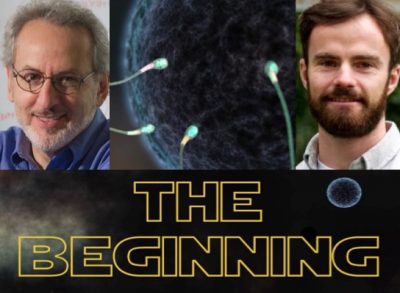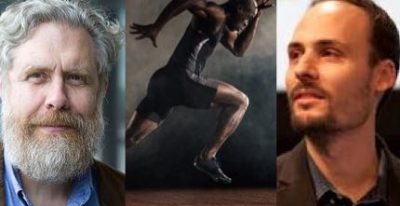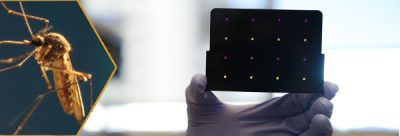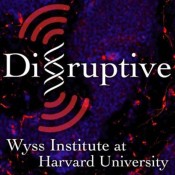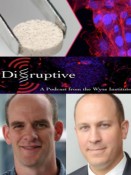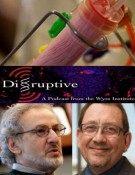DISRUPTIVE
This podcast series is produced with Harvard’s Wyss Institute for Biologically Inspired Engineering and features interviews with their scientists. The Wyss Institute aims to transform healthcare, industry, and the environment by emulating the way nature builds. Their work is disruptive not only in terms of science but also in how they stretch the usual boundaries of academia. Monthly interviews give listeners a sense of the people as well as their most cutting-edge ideas and technologies.
You can browse podcasts below, search by name of guest in the Search window at the top of the site, or check the alphabetical list of guests here.
- NEW Disruptive podcast: Star Wars-inspired Video Project Yields Discovery at Nanoscale
Seen the new Star Wars movie? Check out The Beginning, a 3 minute Star Wars
inspired video with sperm as X-wing fighters competing to fertilize an egg.
“Only one will dictate the future for generations to come…” Don Ingber and
Charles Reilly discuss their creative project aimed at better communicating
science to the public …and how they made a scientific discovery along the way.
Continue reading → - Disruptive #10: Sports Genomics
With 100 trillion cells in the human body, bacteria outnumber our own human cells 2 to 1. These bacteria make up one’s microbiome and play a role in our health, development and wellness, including endurance, recovery and mental aptitude.
In this episode of Disruptive, Wyss Core Faculty member George Church and research fellow Jonathan Scheiman explore this provocative question: What if we could tap the gut bacteria of elite athletes to produce customized probiotics – and what if those probiotics could give recipients access to some of the biological advantages that make those athletes elite?
Continue reading → - Disruptive #7: FISSEQ – Fluorescent In Situ Sequencing
Until recently, to analyze many mRNAs simultaneously, scientists had to grind cells to a pulp, which left them unable to pinpoint those mRNAs within the cell. Developed by a team at the Wyss and Harvard Medical School, FISSEQ allows scientists to pinpoint thousands of mRNAs and other types of RNAs at once in intact cells, and stands to revolutionize clinical diagnostics and drug discovery.
Listen and subscribe to Disruptive on Soundcloud, iTunes, or Google Play.
Continue reading → - Disruptive#6: Rapid, Low-cost, Paper-based Test for ZikaIn early May, a rapid, low-cost, freeze-dried, paper-based, strain-specific diagnostic system for detection of the Zika virus was introduced by an international team of researchers led by James Collins of Harvard’s Wyss Institute for Biologically Inspired Engineering. The core of the test kit is a piece of paper that changes color in the presence of Zika virus RNA and produces results in two to three hours. University of Toronto biochemist Keith Pardee says that it should cost less than a dollar per test. And, according to Collins, in response to a new outbreak, a custom tailored diagnostic system could be ready for use within one week’s time.In this 53-minute podcast, I speak with Collins and Pardee, and explore how they did it, what they learned, and what this might mean for the future. Listen and subscribe to Disruptive on Soundcloud, iTunes, or Google Play.
Continue reading → - Disruptive #5: Molecular Robotics – Building with DNA
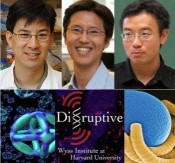
DISRUPTIVE – the podcast from Harvard’s Wyss Institute for Biologically Inspired Engineering.
We’re learning to take advantage of properties of DNA that have served nature well- but in ways nature may have never pursued. We build with it. We tap its capacity to carry information to enhance our ability to explore the inner life of cells.
In this episode, Wyss faculty members William Shih, Wesley Wong and Peng Yin share what it’s like being on the frontier of science, explain how and why they program DNA, and consider potential applications of their work.
Disruptive: Molecular Robotics transcript
Continue reading → - Disruptive: Synthetic Biology Pamela Silver & George Church
I’m excited to offer the first episode of DISRUPTIVE, my new monthly podcast series produced with Harvard’s Wyss Institute for Biologically Inspired Engineering. The mission of the Wyss Institute is to: Transform healthcare, industry, and the environment by emulating the way nature builds, with a focus on technology development and its translation into products and therapies that will have an impact on the world in which we live. Their work is disruptive not only in terms of science but also in how they stretch the usual boundaries of academia.
In this inaugural episode, Wyss core faculty members Pamela Silver and George Church explain how, with today’s technology breakthroughs, modifications to an organism’s genome can be conducted more cheaply, efficiently, and effectively than ever before. Researchers are programming microbes to treat wastewater, generate electricity, manufacture jet fuel, create hemoglobin, and fabricate new drugs. What sounds like science fiction to most of us might be a reality in our lifetimes: the ability to build diagnostic tools that live within our bodies, find ways to eradicate malaria from mosquito lines, or possibly even make genetic improvements in humans that are passed down to future generations. Silver and Church discuss both the high-impact benefits of their work as well as their commitment to the prevention of unintended consequences in this new age of genetic engineering.
Continue reading → - Disruptive: Cancer Vaccine & Hydrogel Drug Delivery
Welcome to DISRUPTIVE the podcast from Harvard’s Wyss Institute for Biologically Inspired Engineering.
In this episode of DISRUPTIVE, we will focus on a cancer vaccine and hydrogel drug depots – both being developed by Wyss Founding Core Faculty Member, DAVE MOONEY. Mooney says the human immune system is the most efficient weapon on the planet to fight disease. Cancer, however, resists treatment and cure by evading the immune system. Unlike bacterial cells or viruses, cancer cells belong in the body, but are simply mutated and misplaced. Scientists have been trying to develop vaccines that provoke the immune system to recognize cancer cells as foreign and attack them. The approach developed by Mooney’s group, in which they reprogram immune cells from inside the body using implantable biomaterials, appears simpler and more effective than other cancer vaccines currently in clinical trials. In one study, 50% of mice treated with two doses of the vaccine — mice that would have otherwise died from melanoma within about 25 days — showed complete tumor regression. On a second front, when it comes to delivering drugs or protein-based therapeutics, doctors often give patients pills or inject the drug into their bloodstream. Both are inefficient methods for delivering effective doses to targeted tissues. Mooney and his team at Wyss are taking a new approach using biocompatible and biodegradable hydrogels. They’ve developed a gel-based sponge that can be molded to any shape, loaded with drugs or stem cells, compressed to a fraction of its size, and delivered via injection. Once inside the body, it pops back to its original shape, gradually releases its payload, and safely degrades. After we explore both of these exciting projects with Mooney, we take a closer look at the process of translation of hydrogel technology into products and therapies with Chris Gemmiti, a business development lead at Wyss.
Continue reading → - DISRUPTIVE: BIO-INSPIRED ROBOTICS features three separate interviews with (1) RADHIKA NAGPAL, (2) ROBERT WOOD, and (3) CONOR WALSH
Welcome to the second episode of my new monthly podcast series produced with Harvard’s Wyss Institute for Biologically Inspired Engineering.
DISRUPTIVE: BIO-INSPIRED ROBOTICS features three separate interviews with (1) RADHIKA NAGPAL, (2) ROBERT WOOD, and (3) CONOR WALSH. From insects in your backyard, to creatures in the sea, to what you see in the mirror, engineers and scientists at Wyss are drawing inspiration to design a whole new class of smart robotic devices
In this one, CONOR WALSH discusses how a wearable robotic exosuit or soft robotic glove can assist people with mobility impairments, as well as how the goal to create real-world applications drives his research approach.
In part one, RADHIKA NAGPAL talks about her work Inspired by social insects and multicellular systems, including the TERMES robots for collective construction of 3D structures, and the KILOBOT thousand-robot swarm. She also speaks candidly about the challenges faced by women in the engineering and computer science fields.
In part two, ROBERT WOOD discusses new manufacturing techniques that are enabling popup and soft robots. His team’s ROBO-BEE is the first insect-sized winged robot to demonstrate controlled flight.
The mission of the Wyss Institute is to: Transform healthcare, industry, and the environment by emulating the way nature builds, with a focus on technology development and its translation into products and therapies that will have an impact on the world in which we live. Their work is disruptive not only in terms of science but also in how they stretch the usual boundaries of academia.
http://wyss.harvard.edu/
– See more at:DISRUPTIVE: BIO-INSPIRED ROBOTICS Radhika Nagpal Interview
DISRUPTIVE: BIO-INSPIRED ROBOTICS Robert Wood Interview
Conor Walsh’s interview transcript
http://aworldthatjustmightwork.com/2015/07/auto-draft-18/
Continue reading → - DISRUPTIVE: CONFRONTING SEPSIS – Don Ingber and Mike Super
Welcome to DISRUPTIVE the podcast from Harvard’s Wyss Institute for Biologically Inspired Engineering.
In this episode of DISRUPTIVE, we will focus on: CONFRONTING SEPSIS.
Sepsis is a bloodstream infection in which the body’s organs become inflamed and susceptible to failure. The leading cause of hospital deaths, sepsis kills at least eight million people worldwide each year. It can be caused by 6 species of fungi and 1400 species of bacteria. Diagnosis takes two to five days, and every hour you wait can increase the risk of death by 5-9%.
“Even with the best current treatments, sepsis patients are dying in intensive care units at least 30% of the time,” says one of today’s guests, Wyss Senior Staff Scientist Mike Super.
A new device developed by a team at Wyss may radically transform the way we treat sepsis. Their blood-cleansing approach can be administered quickly, even without identifying the infectious agent. In animal studies, treatment with this device reduced the number of targeted pathogens and toxins circulating in the bloodstream by more than 99%.
The mission of the Wyss Institute is to: Transform healthcare, industry, and the environment by emulating the way nature builds, with a focus on technology development and its translation into products and therapies that will have an impact on the world in which we live. Their work is disruptive not only in terms of science but also in how they stretch the usual boundaries of academia.
Don Ingber and Mike Super’s Interview transcript
Continue reading → - DISRUPTIVE: BIO-INSPIRED ROBOTICS features three separate interviews with (1) RADHIKA NAGPAL, (2) ROBERT WOOD, and (3) CONOR WALSH
Welcome to the second episode of my new monthly podcast series produced with Harvard’s Wyss Institute for Biologically Inspired Engineering.
DISRUPTIVE: BIO-INSPIRED ROBOTICS features three separate interviews with (1) RADHIKA NAGPAL, (2) ROBERT WOOD, and (3) CONOR WALSH. From insects in your backyard, to creatures in the sea, to what you see in the mirror, engineers and scientists at Wyss are drawing inspiration to design a whole new class of smart robotic devices
In this one, ROBERT WOOD discusses new manufacturing techniques that are enabling popup and soft robots. His team’s ROBO-BEE is the first insect-sized winged robot to demonstrate controlled flight.
In part one, RADHIKA NAGPAL talks about her work Inspired by social insects and multicellular systems, including the TERMES robots for collective construction of 3D structures, and the KILOBOT thousand-robot swarm. She also speaks candidly about the challenges faced by women in the engineering and computer science fields.
In part three, CONOR WALSH discusses how a wearable robotic exosuit or soft robotic glove could assist people with mobility impairments, as well as how the goal to create real-world applications drives his research approach.
The mission of the Wyss Institute is to: Transform healthcare, industry, and the environment by emulating the way nature builds, with a focus on technology development and its translation into products and therapies that will have an impact on the world in which we live. Their work is disruptive not only in terms of science but also in how they stretch the usual boundaries of academia.
http://wyss.harvard.edu/
– See more at:DISRUPTIVE: BIO-INSPIRED ROBOTICS Radhika Nagpal Interview
DISRUPTIVE: BIO-INSPIRED ROBOTICS Conor Walsh Interview
Robert Wood’s interview transcript
Continue reading →

